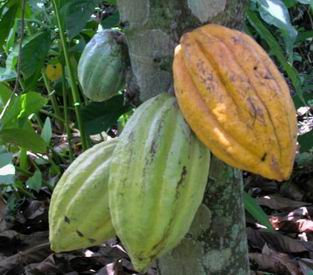 There is a great disparity of wealth in the United States right now. Over the last two decades, the invisible hand of the market has re-oriented the global economy in such a way that labor-intensive industries have moved overseas, along with the middle and lower-middle class jobs from the States. As the number of manual labor jobs has declined, the demand for skilled labor within the service and financial sectors has increased, and salaries have risen. The end result: in 2009, the top 5% of earners saw their average incomes increase, while the rest of the country saw their average incomes decrease. The top 1% of the country owns 24% of the wealth – the highest percentage since the Great Depression. We are like a banana republic (the country, not the store). In a nutshell:
There is a great disparity of wealth in the United States right now. Over the last two decades, the invisible hand of the market has re-oriented the global economy in such a way that labor-intensive industries have moved overseas, along with the middle and lower-middle class jobs from the States. As the number of manual labor jobs has declined, the demand for skilled labor within the service and financial sectors has increased, and salaries have risen. The end result: in 2009, the top 5% of earners saw their average incomes increase, while the rest of the country saw their average incomes decrease. The top 1% of the country owns 24% of the wealth – the highest percentage since the Great Depression. We are like a banana republic (the country, not the store). In a nutshell:
This is what the political scientists Jacob Hacker and Paul Pierson call the “winner-take-all economy.” It is not a picture of a healthy society. Such a level of economic inequality, not seen in the United States since the eve of the Great Depression, bespeaks a political economy in which the financial rewards are increasingly concentrated among a tiny elite and whose risks are borne by an increasingly exposed and unprotected middle class. Income inequality in the United States is higher than in any other advanced industrial democracy and by conventional measures comparable to that in countries such as Ghana, Nicaragua, and Turkmenistan. It breeds political polarization, mistrust, and resentment between the haves and the have-nots and tends to distort the workings of a democratic political system in which money increasingly confers political voice and power. Continue reading


 The big news in this part of the world (West Africa) is the recent democratic election in Cote D’Ivoire, which saw the anointing of not one but two presidents. The incumbent president, who has led the country for 10 years and is constitutionally barred from seeking a third term in office, is refusing to step down after a decisive 54-46 loss to Alassane Ouattara, an economist and technocrat who also happens to be both a Muslim and a leader of the rebel groups in the north. The international community has unanimously rallied behind Ouattara and called for Gbagbo to step aside. The World Bank has suspended aid to the country, and Ouattara has called for the Central Bank to stop releasing money as a way to “starve the beast,” and turn hungry soldiers against the incumbent president. Unfortunately, with 173 people killed so far in the post-election violence, analysts are
The big news in this part of the world (West Africa) is the recent democratic election in Cote D’Ivoire, which saw the anointing of not one but two presidents. The incumbent president, who has led the country for 10 years and is constitutionally barred from seeking a third term in office, is refusing to step down after a decisive 54-46 loss to Alassane Ouattara, an economist and technocrat who also happens to be both a Muslim and a leader of the rebel groups in the north. The international community has unanimously rallied behind Ouattara and called for Gbagbo to step aside. The World Bank has suspended aid to the country, and Ouattara has called for the Central Bank to stop releasing money as a way to “starve the beast,” and turn hungry soldiers against the incumbent president. Unfortunately, with 173 people killed so far in the post-election violence, analysts are